Analysis of Taylor's Scientific Management and Fayol's Principles
VerifiedAdded on 2020/05/28
|10
|1858
|286
Report
AI Summary
This report delves into the evolution of management thinking, focusing on two pivotal theories: Taylor's Scientific Management and Fayol's Principles of Management. It begins with an executive summary and table of contents, setting the stage for an in-depth analysis. The report explores Taylor's theory, emphasizing its focus on increasing labor productivity and efficiency through workflow investigation, using Ford as a case study. It highlights the benefits such as enhanced production and efficient resource utilization, alongside limitations like high capital requirements and time consumption. The analysis further examines the impact of Taylor's theory on the assembly line process, leading to affordable car production, and its recognition worldwide, while also critiquing the potential for worker exploitation due to the piece rate system. The report then transitions to Henry Fayol's theory, detailing its principles of planning, organizing, coordinating, and controlling, and uses KFC as a case study. It discusses the benefits, such as increased efficiency within organizational structures, and limitations, including the potential for human error and the impact on organizational harmony. The analysis notes the importance of authority and responsibility, and also touches upon violations of business ethics, while the recommendations emphasize the need to balance individual and organizational interests and the importance of labor productivity. The report concludes with a comprehensive list of references.
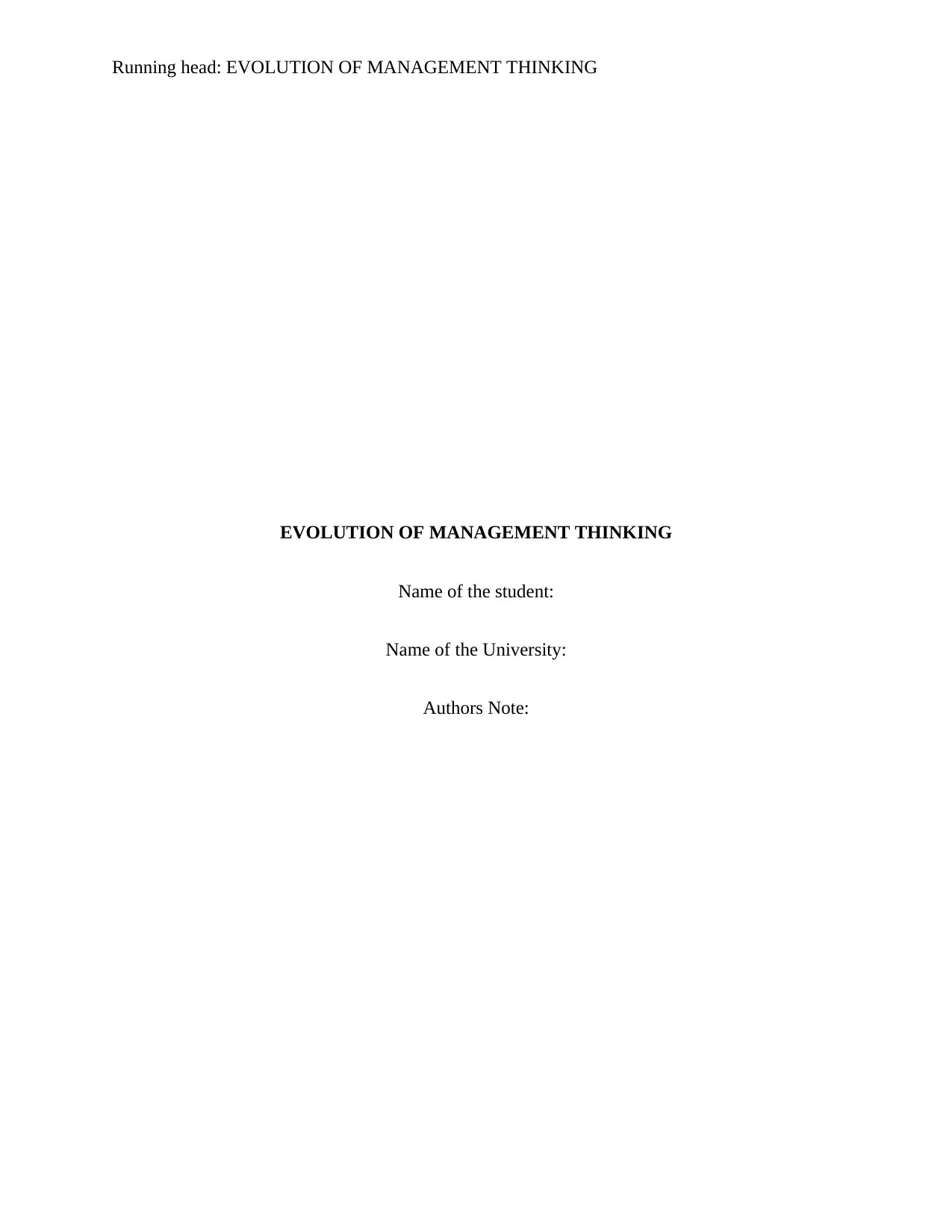
Running head: EVOLUTION OF MANAGEMENT THINKING
EVOLUTION OF MANAGEMENT THINKING
Name of the student:
Name of the University:
Authors Note:
EVOLUTION OF MANAGEMENT THINKING
Name of the student:
Name of the University:
Authors Note:
Paraphrase This Document
Need a fresh take? Get an instant paraphrase of this document with our AI Paraphraser
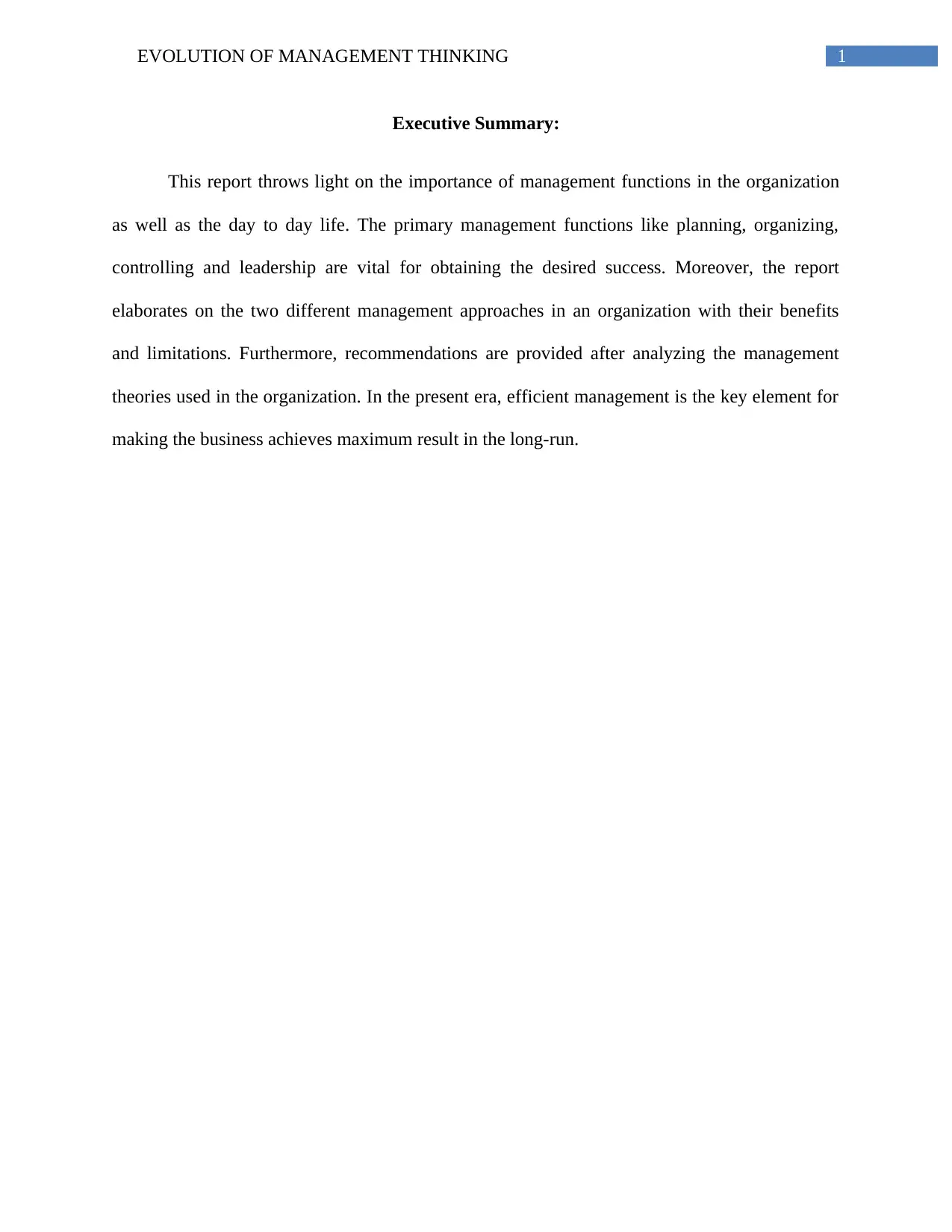
1EVOLUTION OF MANAGEMENT THINKING
Executive Summary:
This report throws light on the importance of management functions in the organization
as well as the day to day life. The primary management functions like planning, organizing,
controlling and leadership are vital for obtaining the desired success. Moreover, the report
elaborates on the two different management approaches in an organization with their benefits
and limitations. Furthermore, recommendations are provided after analyzing the management
theories used in the organization. In the present era, efficient management is the key element for
making the business achieves maximum result in the long-run.
Executive Summary:
This report throws light on the importance of management functions in the organization
as well as the day to day life. The primary management functions like planning, organizing,
controlling and leadership are vital for obtaining the desired success. Moreover, the report
elaborates on the two different management approaches in an organization with their benefits
and limitations. Furthermore, recommendations are provided after analyzing the management
theories used in the organization. In the present era, efficient management is the key element for
making the business achieves maximum result in the long-run.
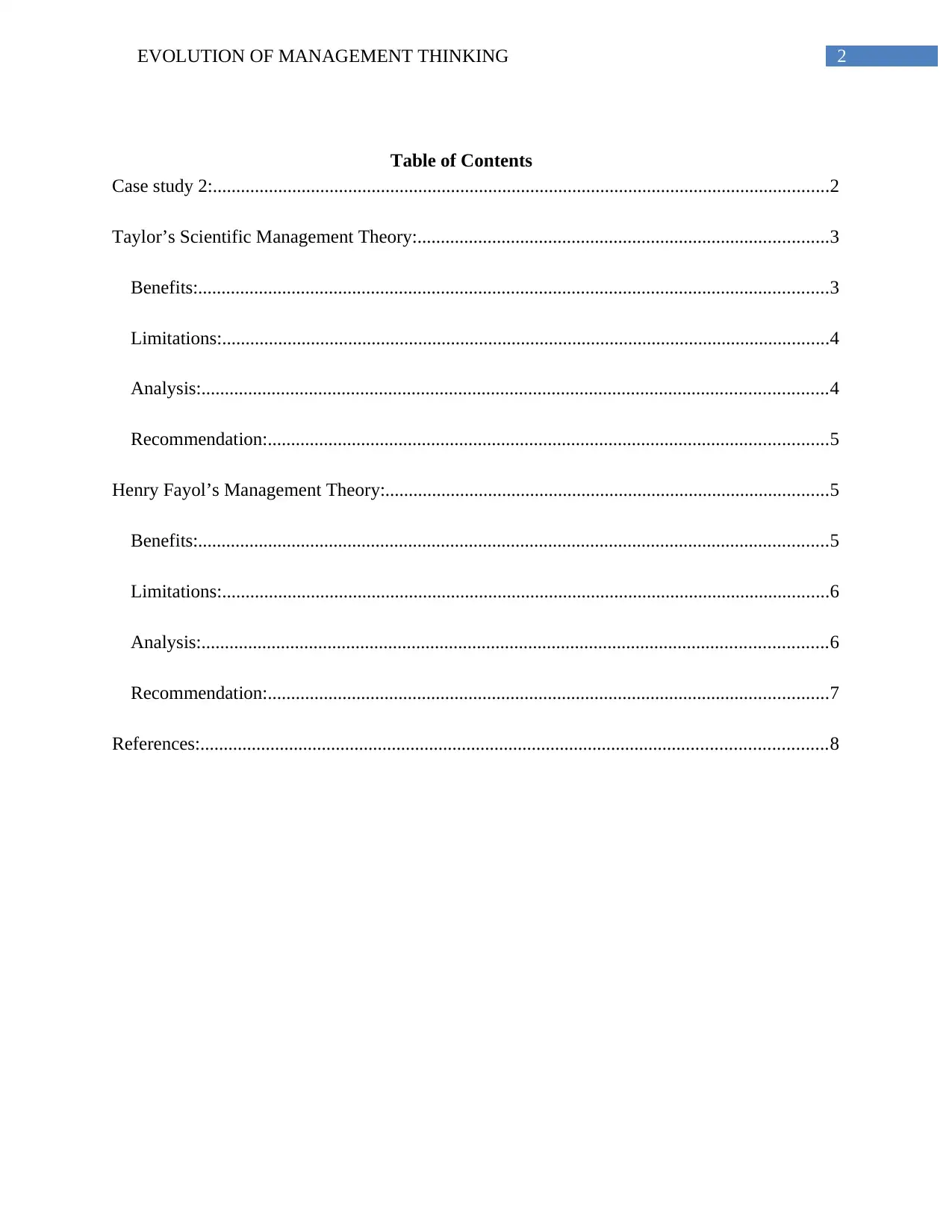
2EVOLUTION OF MANAGEMENT THINKING
Table of Contents
Case study 2:....................................................................................................................................2
Taylor’s Scientific Management Theory:........................................................................................3
Benefits:.......................................................................................................................................3
Limitations:..................................................................................................................................4
Analysis:......................................................................................................................................4
Recommendation:........................................................................................................................5
Henry Fayol’s Management Theory:...............................................................................................5
Benefits:.......................................................................................................................................5
Limitations:..................................................................................................................................6
Analysis:......................................................................................................................................6
Recommendation:........................................................................................................................7
References:......................................................................................................................................8
Table of Contents
Case study 2:....................................................................................................................................2
Taylor’s Scientific Management Theory:........................................................................................3
Benefits:.......................................................................................................................................3
Limitations:..................................................................................................................................4
Analysis:......................................................................................................................................4
Recommendation:........................................................................................................................5
Henry Fayol’s Management Theory:...............................................................................................5
Benefits:.......................................................................................................................................5
Limitations:..................................................................................................................................6
Analysis:......................................................................................................................................6
Recommendation:........................................................................................................................7
References:......................................................................................................................................8
⊘ This is a preview!⊘
Do you want full access?
Subscribe today to unlock all pages.

Trusted by 1+ million students worldwide
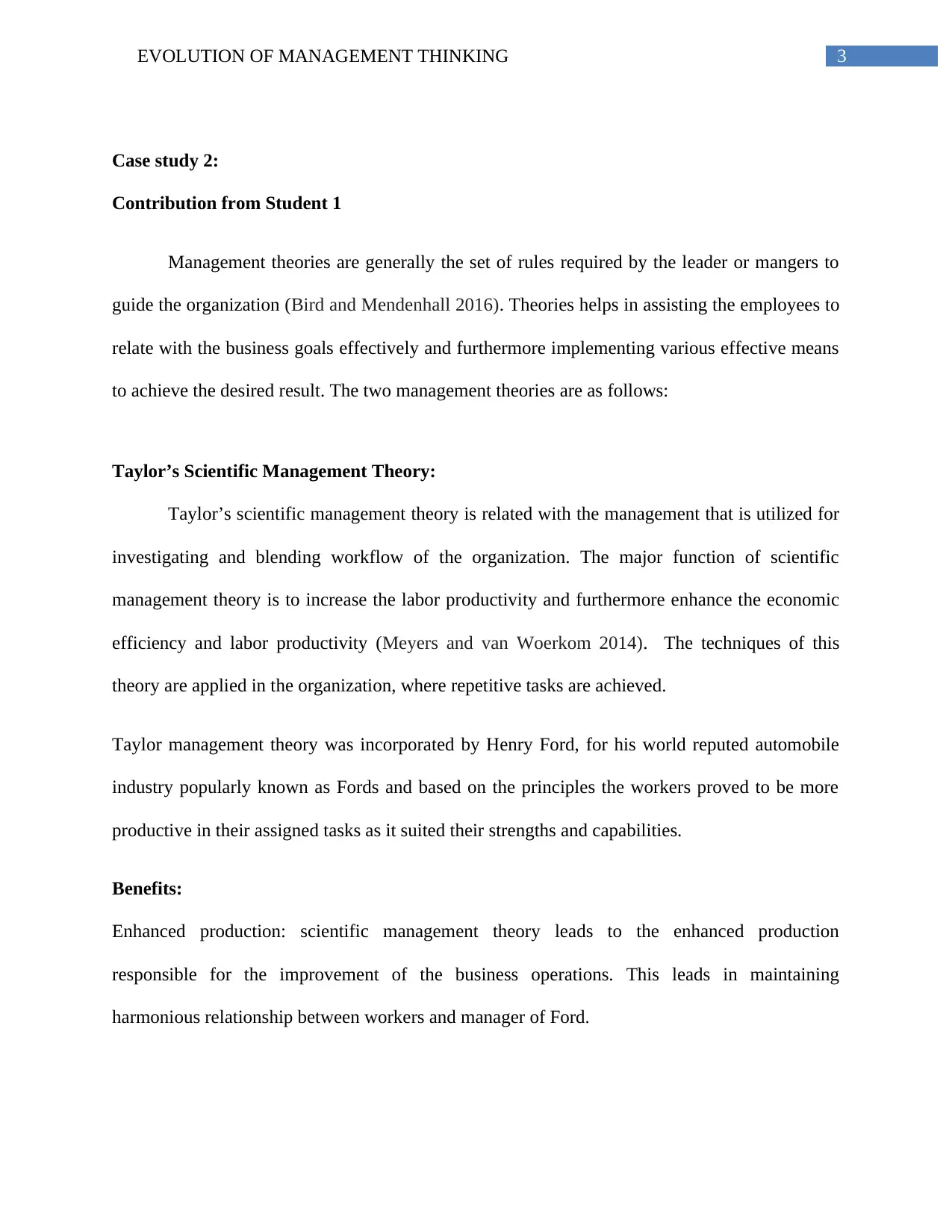
3EVOLUTION OF MANAGEMENT THINKING
Case study 2:
Contribution from Student 1
Management theories are generally the set of rules required by the leader or mangers to
guide the organization (Bird and Mendenhall 2016). Theories helps in assisting the employees to
relate with the business goals effectively and furthermore implementing various effective means
to achieve the desired result. The two management theories are as follows:
Taylor’s Scientific Management Theory:
Taylor’s scientific management theory is related with the management that is utilized for
investigating and blending workflow of the organization. The major function of scientific
management theory is to increase the labor productivity and furthermore enhance the economic
efficiency and labor productivity (Meyers and van Woerkom 2014). The techniques of this
theory are applied in the organization, where repetitive tasks are achieved.
Taylor management theory was incorporated by Henry Ford, for his world reputed automobile
industry popularly known as Fords and based on the principles the workers proved to be more
productive in their assigned tasks as it suited their strengths and capabilities.
Benefits:
Enhanced production: scientific management theory leads to the enhanced production
responsible for the improvement of the business operations. This leads in maintaining
harmonious relationship between workers and manager of Ford.
Case study 2:
Contribution from Student 1
Management theories are generally the set of rules required by the leader or mangers to
guide the organization (Bird and Mendenhall 2016). Theories helps in assisting the employees to
relate with the business goals effectively and furthermore implementing various effective means
to achieve the desired result. The two management theories are as follows:
Taylor’s Scientific Management Theory:
Taylor’s scientific management theory is related with the management that is utilized for
investigating and blending workflow of the organization. The major function of scientific
management theory is to increase the labor productivity and furthermore enhance the economic
efficiency and labor productivity (Meyers and van Woerkom 2014). The techniques of this
theory are applied in the organization, where repetitive tasks are achieved.
Taylor management theory was incorporated by Henry Ford, for his world reputed automobile
industry popularly known as Fords and based on the principles the workers proved to be more
productive in their assigned tasks as it suited their strengths and capabilities.
Benefits:
Enhanced production: scientific management theory leads to the enhanced production
responsible for the improvement of the business operations. This leads in maintaining
harmonious relationship between workers and manager of Ford.
Paraphrase This Document
Need a fresh take? Get an instant paraphrase of this document with our AI Paraphraser
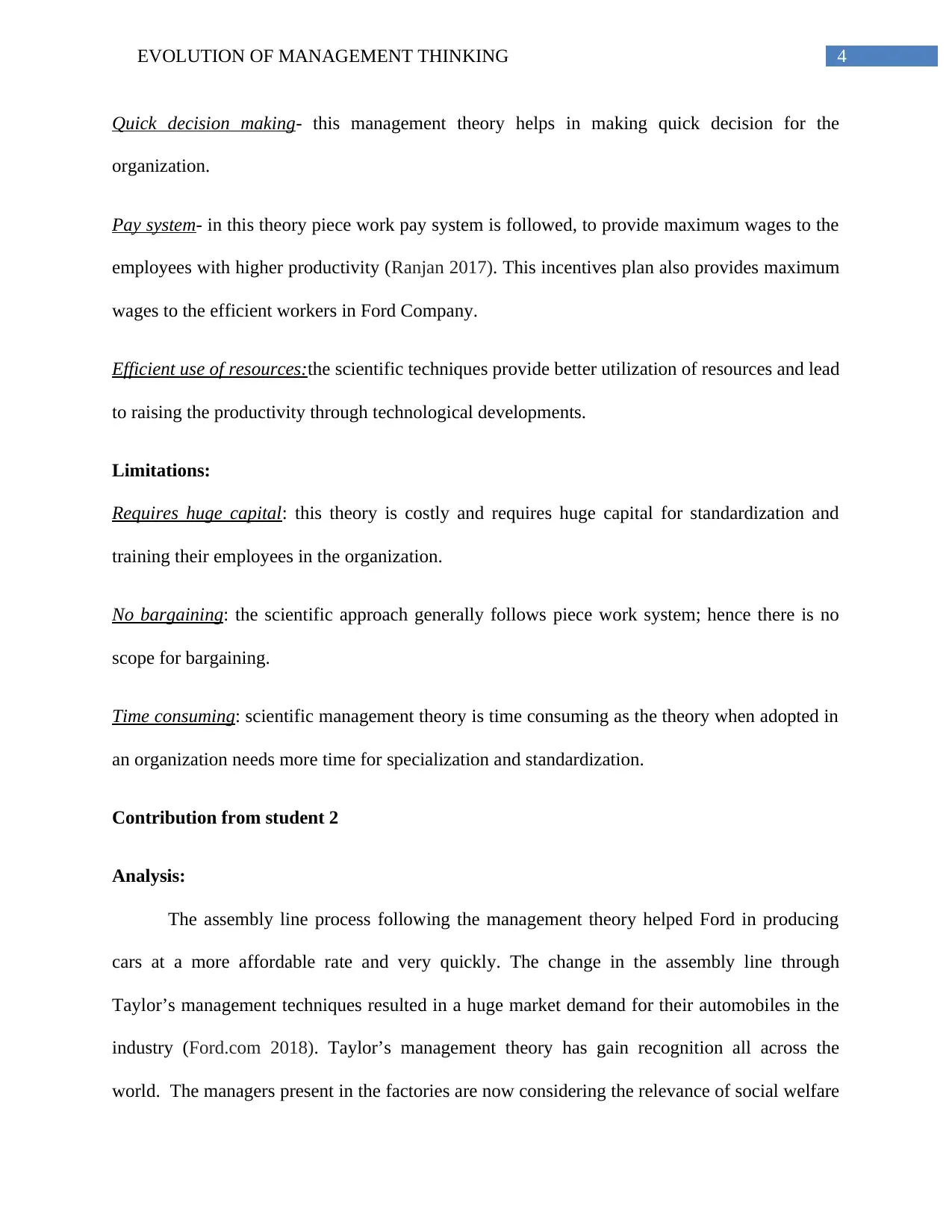
4EVOLUTION OF MANAGEMENT THINKING
Quick decision making- this management theory helps in making quick decision for the
organization.
Pay system- in this theory piece work pay system is followed, to provide maximum wages to the
employees with higher productivity (Ranjan 2017). This incentives plan also provides maximum
wages to the efficient workers in Ford Company.
Efficient use of resources:the scientific techniques provide better utilization of resources and lead
to raising the productivity through technological developments.
Limitations:
Requires huge capital: this theory is costly and requires huge capital for standardization and
training their employees in the organization.
No bargaining: the scientific approach generally follows piece work system; hence there is no
scope for bargaining.
Time consuming: scientific management theory is time consuming as the theory when adopted in
an organization needs more time for specialization and standardization.
Contribution from student 2
Analysis:
The assembly line process following the management theory helped Ford in producing
cars at a more affordable rate and very quickly. The change in the assembly line through
Taylor’s management techniques resulted in a huge market demand for their automobiles in the
industry (Ford.com 2018). Taylor’s management theory has gain recognition all across the
world. The managers present in the factories are now considering the relevance of social welfare
Quick decision making- this management theory helps in making quick decision for the
organization.
Pay system- in this theory piece work pay system is followed, to provide maximum wages to the
employees with higher productivity (Ranjan 2017). This incentives plan also provides maximum
wages to the efficient workers in Ford Company.
Efficient use of resources:the scientific techniques provide better utilization of resources and lead
to raising the productivity through technological developments.
Limitations:
Requires huge capital: this theory is costly and requires huge capital for standardization and
training their employees in the organization.
No bargaining: the scientific approach generally follows piece work system; hence there is no
scope for bargaining.
Time consuming: scientific management theory is time consuming as the theory when adopted in
an organization needs more time for specialization and standardization.
Contribution from student 2
Analysis:
The assembly line process following the management theory helped Ford in producing
cars at a more affordable rate and very quickly. The change in the assembly line through
Taylor’s management techniques resulted in a huge market demand for their automobiles in the
industry (Ford.com 2018). Taylor’s management theory has gain recognition all across the
world. The managers present in the factories are now considering the relevance of social welfare
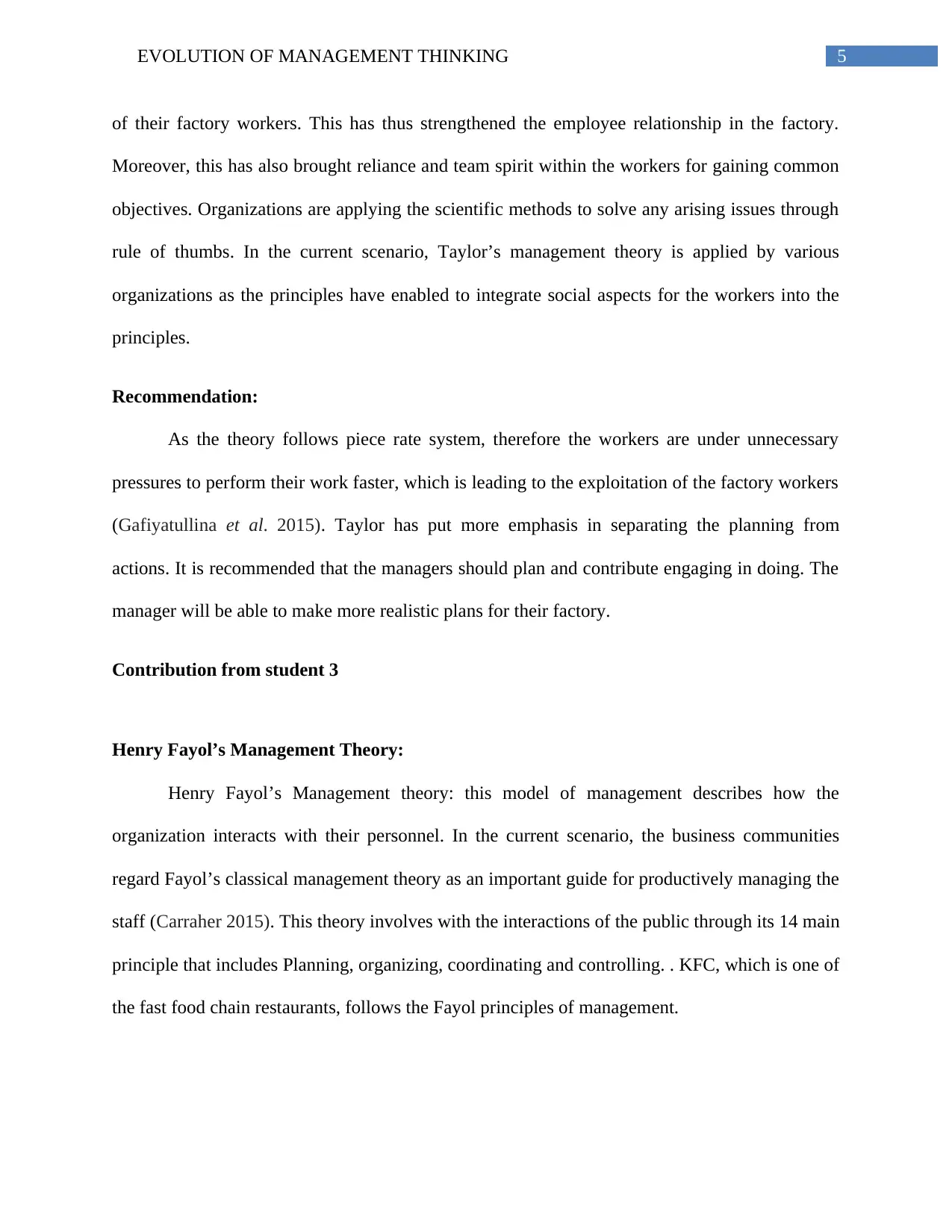
5EVOLUTION OF MANAGEMENT THINKING
of their factory workers. This has thus strengthened the employee relationship in the factory.
Moreover, this has also brought reliance and team spirit within the workers for gaining common
objectives. Organizations are applying the scientific methods to solve any arising issues through
rule of thumbs. In the current scenario, Taylor’s management theory is applied by various
organizations as the principles have enabled to integrate social aspects for the workers into the
principles.
Recommendation:
As the theory follows piece rate system, therefore the workers are under unnecessary
pressures to perform their work faster, which is leading to the exploitation of the factory workers
(Gafiyatullina et al. 2015). Taylor has put more emphasis in separating the planning from
actions. It is recommended that the managers should plan and contribute engaging in doing. The
manager will be able to make more realistic plans for their factory.
Contribution from student 3
Henry Fayol’s Management Theory:
Henry Fayol’s Management theory: this model of management describes how the
organization interacts with their personnel. In the current scenario, the business communities
regard Fayol’s classical management theory as an important guide for productively managing the
staff (Carraher 2015). This theory involves with the interactions of the public through its 14 main
principle that includes Planning, organizing, coordinating and controlling. . KFC, which is one of
the fast food chain restaurants, follows the Fayol principles of management.
of their factory workers. This has thus strengthened the employee relationship in the factory.
Moreover, this has also brought reliance and team spirit within the workers for gaining common
objectives. Organizations are applying the scientific methods to solve any arising issues through
rule of thumbs. In the current scenario, Taylor’s management theory is applied by various
organizations as the principles have enabled to integrate social aspects for the workers into the
principles.
Recommendation:
As the theory follows piece rate system, therefore the workers are under unnecessary
pressures to perform their work faster, which is leading to the exploitation of the factory workers
(Gafiyatullina et al. 2015). Taylor has put more emphasis in separating the planning from
actions. It is recommended that the managers should plan and contribute engaging in doing. The
manager will be able to make more realistic plans for their factory.
Contribution from student 3
Henry Fayol’s Management Theory:
Henry Fayol’s Management theory: this model of management describes how the
organization interacts with their personnel. In the current scenario, the business communities
regard Fayol’s classical management theory as an important guide for productively managing the
staff (Carraher 2015). This theory involves with the interactions of the public through its 14 main
principle that includes Planning, organizing, coordinating and controlling. . KFC, which is one of
the fast food chain restaurants, follows the Fayol principles of management.
⊘ This is a preview!⊘
Do you want full access?
Subscribe today to unlock all pages.

Trusted by 1+ million students worldwide
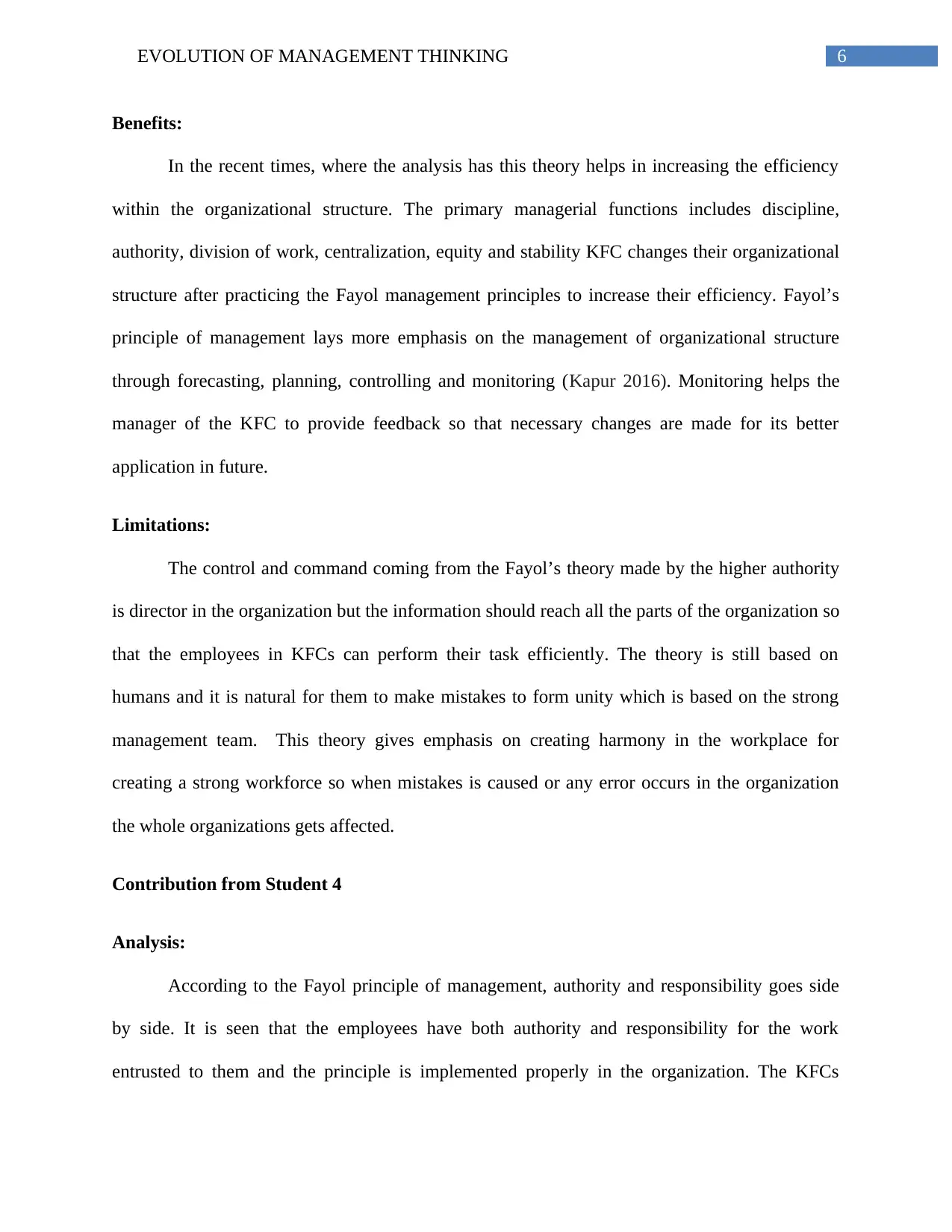
6EVOLUTION OF MANAGEMENT THINKING
Benefits:
In the recent times, where the analysis has this theory helps in increasing the efficiency
within the organizational structure. The primary managerial functions includes discipline,
authority, division of work, centralization, equity and stability KFC changes their organizational
structure after practicing the Fayol management principles to increase their efficiency. Fayol’s
principle of management lays more emphasis on the management of organizational structure
through forecasting, planning, controlling and monitoring (Kapur 2016). Monitoring helps the
manager of the KFC to provide feedback so that necessary changes are made for its better
application in future.
Limitations:
The control and command coming from the Fayol’s theory made by the higher authority
is director in the organization but the information should reach all the parts of the organization so
that the employees in KFCs can perform their task efficiently. The theory is still based on
humans and it is natural for them to make mistakes to form unity which is based on the strong
management team. This theory gives emphasis on creating harmony in the workplace for
creating a strong workforce so when mistakes is caused or any error occurs in the organization
the whole organizations gets affected.
Contribution from Student 4
Analysis:
According to the Fayol principle of management, authority and responsibility goes side
by side. It is seen that the employees have both authority and responsibility for the work
entrusted to them and the principle is implemented properly in the organization. The KFCs
Benefits:
In the recent times, where the analysis has this theory helps in increasing the efficiency
within the organizational structure. The primary managerial functions includes discipline,
authority, division of work, centralization, equity and stability KFC changes their organizational
structure after practicing the Fayol management principles to increase their efficiency. Fayol’s
principle of management lays more emphasis on the management of organizational structure
through forecasting, planning, controlling and monitoring (Kapur 2016). Monitoring helps the
manager of the KFC to provide feedback so that necessary changes are made for its better
application in future.
Limitations:
The control and command coming from the Fayol’s theory made by the higher authority
is director in the organization but the information should reach all the parts of the organization so
that the employees in KFCs can perform their task efficiently. The theory is still based on
humans and it is natural for them to make mistakes to form unity which is based on the strong
management team. This theory gives emphasis on creating harmony in the workplace for
creating a strong workforce so when mistakes is caused or any error occurs in the organization
the whole organizations gets affected.
Contribution from Student 4
Analysis:
According to the Fayol principle of management, authority and responsibility goes side
by side. It is seen that the employees have both authority and responsibility for the work
entrusted to them and the principle is implemented properly in the organization. The KFCs
Paraphrase This Document
Need a fresh take? Get an instant paraphrase of this document with our AI Paraphraser
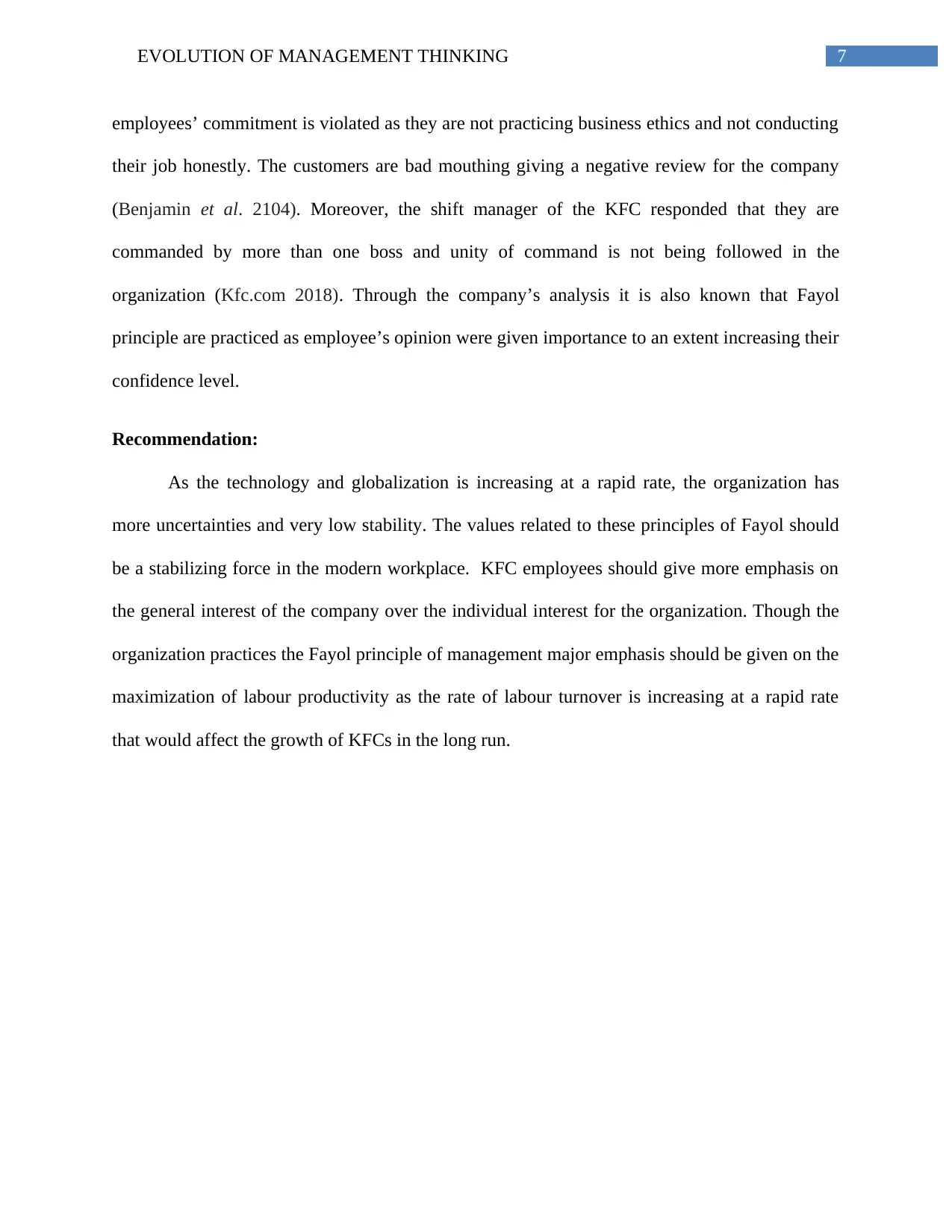
7EVOLUTION OF MANAGEMENT THINKING
employees’ commitment is violated as they are not practicing business ethics and not conducting
their job honestly. The customers are bad mouthing giving a negative review for the company
(Benjamin et al. 2104). Moreover, the shift manager of the KFC responded that they are
commanded by more than one boss and unity of command is not being followed in the
organization (Kfc.com 2018). Through the company’s analysis it is also known that Fayol
principle are practiced as employee’s opinion were given importance to an extent increasing their
confidence level.
Recommendation:
As the technology and globalization is increasing at a rapid rate, the organization has
more uncertainties and very low stability. The values related to these principles of Fayol should
be a stabilizing force in the modern workplace. KFC employees should give more emphasis on
the general interest of the company over the individual interest for the organization. Though the
organization practices the Fayol principle of management major emphasis should be given on the
maximization of labour productivity as the rate of labour turnover is increasing at a rapid rate
that would affect the growth of KFCs in the long run.
employees’ commitment is violated as they are not practicing business ethics and not conducting
their job honestly. The customers are bad mouthing giving a negative review for the company
(Benjamin et al. 2104). Moreover, the shift manager of the KFC responded that they are
commanded by more than one boss and unity of command is not being followed in the
organization (Kfc.com 2018). Through the company’s analysis it is also known that Fayol
principle are practiced as employee’s opinion were given importance to an extent increasing their
confidence level.
Recommendation:
As the technology and globalization is increasing at a rapid rate, the organization has
more uncertainties and very low stability. The values related to these principles of Fayol should
be a stabilizing force in the modern workplace. KFC employees should give more emphasis on
the general interest of the company over the individual interest for the organization. Though the
organization practices the Fayol principle of management major emphasis should be given on the
maximization of labour productivity as the rate of labour turnover is increasing at a rapid rate
that would affect the growth of KFCs in the long run.
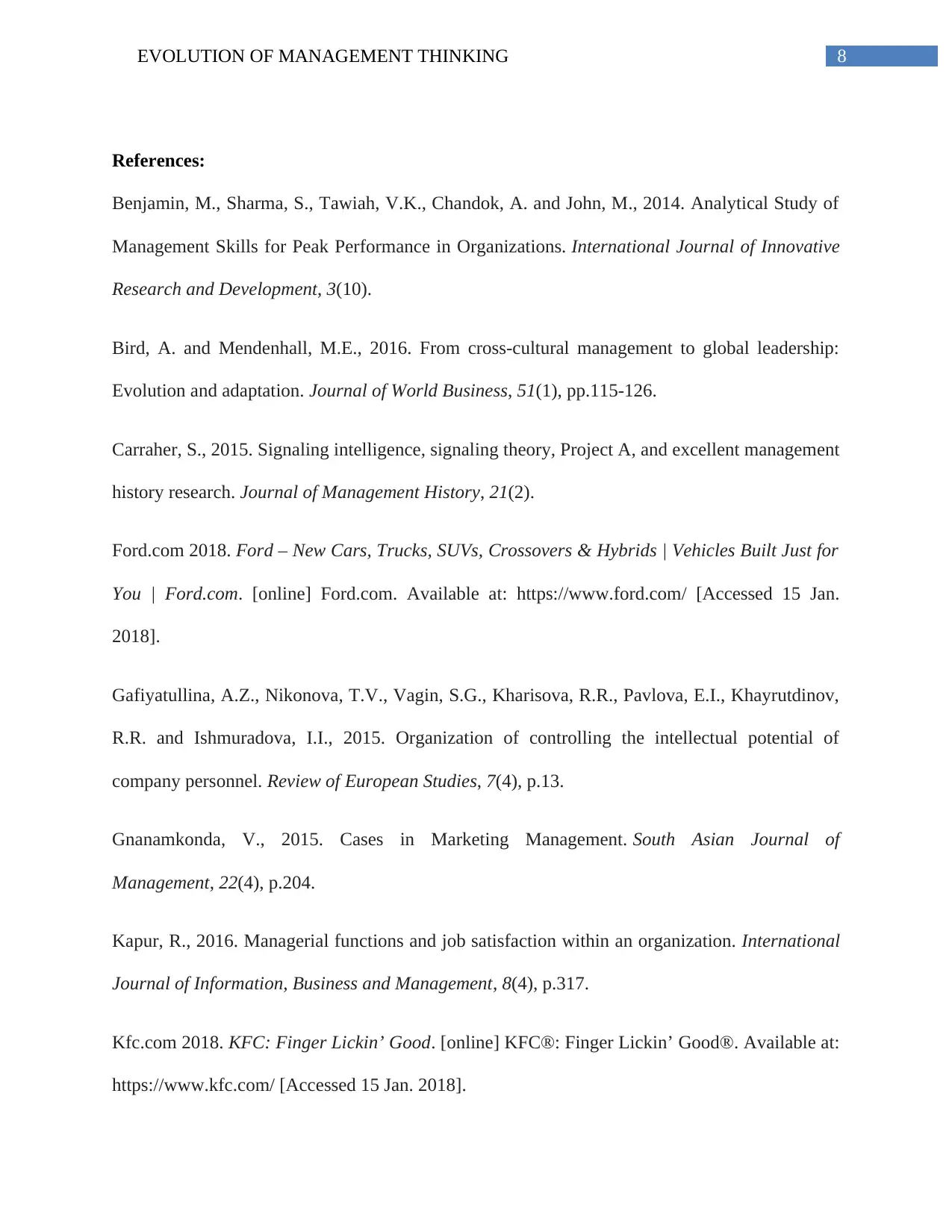
8EVOLUTION OF MANAGEMENT THINKING
References:
Benjamin, M., Sharma, S., Tawiah, V.K., Chandok, A. and John, M., 2014. Analytical Study of
Management Skills for Peak Performance in Organizations. International Journal of Innovative
Research and Development, 3(10).
Bird, A. and Mendenhall, M.E., 2016. From cross-cultural management to global leadership:
Evolution and adaptation. Journal of World Business, 51(1), pp.115-126.
Carraher, S., 2015. Signaling intelligence, signaling theory, Project A, and excellent management
history research. Journal of Management History, 21(2).
Ford.com 2018. Ford – New Cars, Trucks, SUVs, Crossovers & Hybrids | Vehicles Built Just for
You | Ford.com. [online] Ford.com. Available at: https://www.ford.com/ [Accessed 15 Jan.
2018].
Gafiyatullina, A.Z., Nikonova, T.V., Vagin, S.G., Kharisova, R.R., Pavlova, E.I., Khayrutdinov,
R.R. and Ishmuradova, I.I., 2015. Organization of controlling the intellectual potential of
company personnel. Review of European Studies, 7(4), p.13.
Gnanamkonda, V., 2015. Cases in Marketing Management. South Asian Journal of
Management, 22(4), p.204.
Kapur, R., 2016. Managerial functions and job satisfaction within an organization. International
Journal of Information, Business and Management, 8(4), p.317.
Kfc.com 2018. KFC: Finger Lickin’ Good. [online] KFC®: Finger Lickin’ Good®. Available at:
https://www.kfc.com/ [Accessed 15 Jan. 2018].
References:
Benjamin, M., Sharma, S., Tawiah, V.K., Chandok, A. and John, M., 2014. Analytical Study of
Management Skills for Peak Performance in Organizations. International Journal of Innovative
Research and Development, 3(10).
Bird, A. and Mendenhall, M.E., 2016. From cross-cultural management to global leadership:
Evolution and adaptation. Journal of World Business, 51(1), pp.115-126.
Carraher, S., 2015. Signaling intelligence, signaling theory, Project A, and excellent management
history research. Journal of Management History, 21(2).
Ford.com 2018. Ford – New Cars, Trucks, SUVs, Crossovers & Hybrids | Vehicles Built Just for
You | Ford.com. [online] Ford.com. Available at: https://www.ford.com/ [Accessed 15 Jan.
2018].
Gafiyatullina, A.Z., Nikonova, T.V., Vagin, S.G., Kharisova, R.R., Pavlova, E.I., Khayrutdinov,
R.R. and Ishmuradova, I.I., 2015. Organization of controlling the intellectual potential of
company personnel. Review of European Studies, 7(4), p.13.
Gnanamkonda, V., 2015. Cases in Marketing Management. South Asian Journal of
Management, 22(4), p.204.
Kapur, R., 2016. Managerial functions and job satisfaction within an organization. International
Journal of Information, Business and Management, 8(4), p.317.
Kfc.com 2018. KFC: Finger Lickin’ Good. [online] KFC®: Finger Lickin’ Good®. Available at:
https://www.kfc.com/ [Accessed 15 Jan. 2018].
⊘ This is a preview!⊘
Do you want full access?
Subscribe today to unlock all pages.

Trusted by 1+ million students worldwide
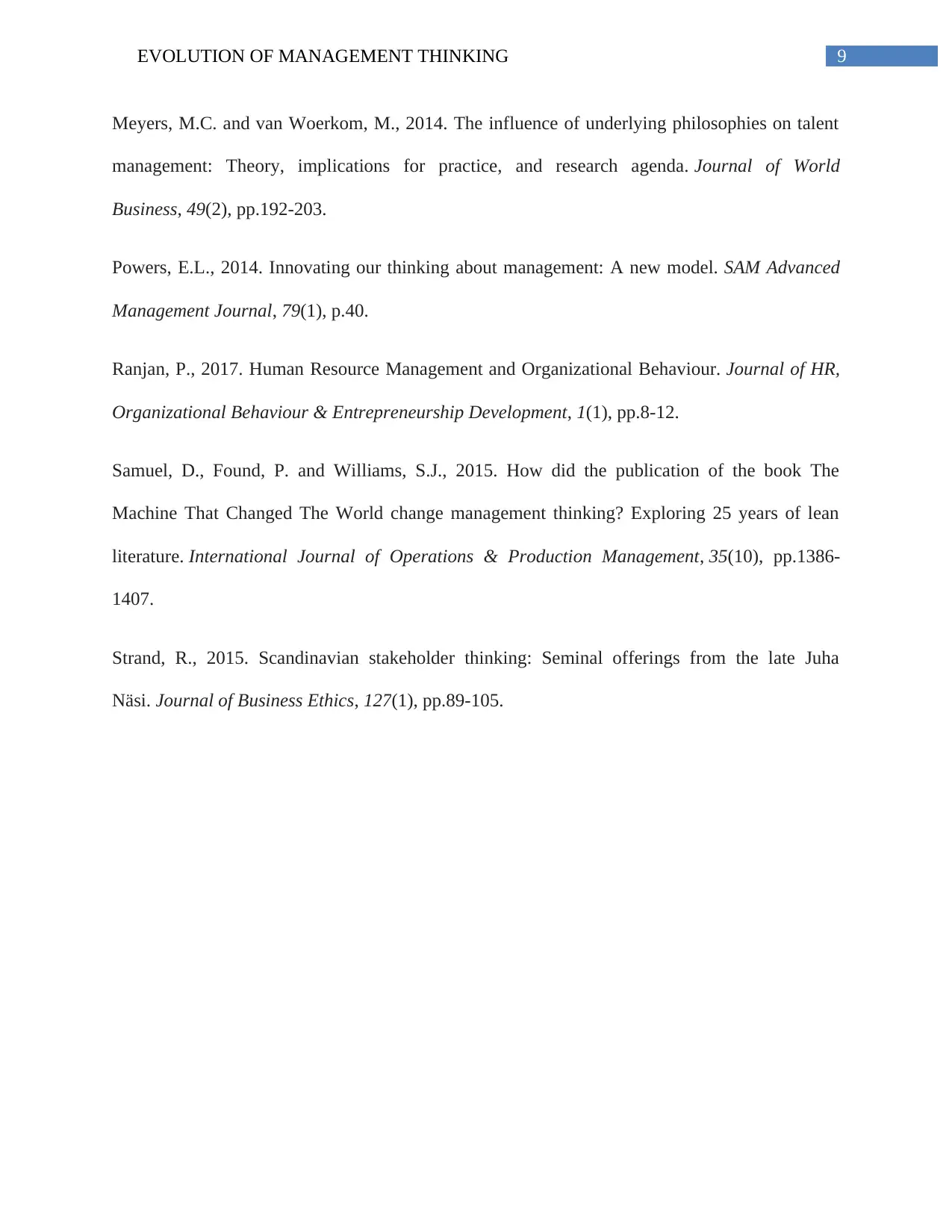
9EVOLUTION OF MANAGEMENT THINKING
Meyers, M.C. and van Woerkom, M., 2014. The influence of underlying philosophies on talent
management: Theory, implications for practice, and research agenda. Journal of World
Business, 49(2), pp.192-203.
Powers, E.L., 2014. Innovating our thinking about management: A new model. SAM Advanced
Management Journal, 79(1), p.40.
Ranjan, P., 2017. Human Resource Management and Organizational Behaviour. Journal of HR,
Organizational Behaviour & Entrepreneurship Development, 1(1), pp.8-12.
Samuel, D., Found, P. and Williams, S.J., 2015. How did the publication of the book The
Machine That Changed The World change management thinking? Exploring 25 years of lean
literature. International Journal of Operations & Production Management, 35(10), pp.1386-
1407.
Strand, R., 2015. Scandinavian stakeholder thinking: Seminal offerings from the late Juha
Näsi. Journal of Business Ethics, 127(1), pp.89-105.
Meyers, M.C. and van Woerkom, M., 2014. The influence of underlying philosophies on talent
management: Theory, implications for practice, and research agenda. Journal of World
Business, 49(2), pp.192-203.
Powers, E.L., 2014. Innovating our thinking about management: A new model. SAM Advanced
Management Journal, 79(1), p.40.
Ranjan, P., 2017. Human Resource Management and Organizational Behaviour. Journal of HR,
Organizational Behaviour & Entrepreneurship Development, 1(1), pp.8-12.
Samuel, D., Found, P. and Williams, S.J., 2015. How did the publication of the book The
Machine That Changed The World change management thinking? Exploring 25 years of lean
literature. International Journal of Operations & Production Management, 35(10), pp.1386-
1407.
Strand, R., 2015. Scandinavian stakeholder thinking: Seminal offerings from the late Juha
Näsi. Journal of Business Ethics, 127(1), pp.89-105.
1 out of 10
Related Documents
Your All-in-One AI-Powered Toolkit for Academic Success.
+13062052269
info@desklib.com
Available 24*7 on WhatsApp / Email
![[object Object]](/_next/static/media/star-bottom.7253800d.svg)
Unlock your academic potential
Copyright © 2020–2026 A2Z Services. All Rights Reserved. Developed and managed by ZUCOL.




